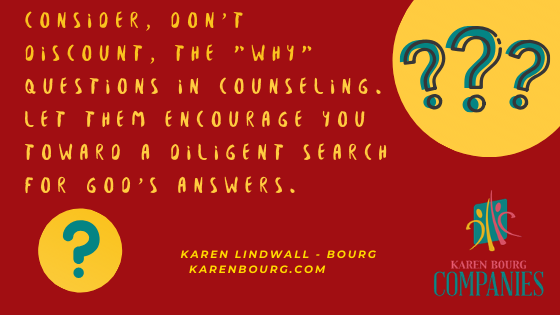What Do You Do with the WHYS in Counseling?
Does the question “why” cause you to be stuck as you counsel people Biblically or does the question “why” encourage you toward a diligent search for God’s answers?
Dave Powlison in X-ray Questions: Drawing Out the Whys and Wherefores of Human Behavior (The Journal of Biblical Counseling • Volume 18 • Number 1 • Fall 1999) says, “explanations are signposts to solutions…” The Bible has a lot to say about our questions of why and our human motivations and the answers all point to the Redeemer. God’s Word searches out the “thoughts and intentions of the heart” and God evaluates what he sees in us (Hebrews 4:12). Good questions can help discern the patterns of a person’s motivation and identify the idols of our hearts.
Ed Welch in Why Ask, “Why?” Four Types of Causes in Counseling (The Journal of Pastoral Practice, Vol. X, No. 3, 1991) encourages us to consider, not to discount, “why” questions in counseling. He uses Aristotle’s “different types of causes” (from his Physics treatise) to illustrate and encourage the use of the question “why” in Biblical Counseling sessions.

Encourage the WHY questions!
Consider the question, “Why are you so angry?”
a. The material cause includes the tangible, physical components of an object or event.
Answer: I am anxious and on medication, it runs in my family, or my hormones are imbalanced.
A Biblical response: each of us is created as three part beings – body, soul, and spirit. Be aware that there are sometimes physical causes and a physician may need to be consulted. However, physical maladies do not make us sin and cannot be held as the exclusive cause of our actions.
b. The efficient cause consists of the events that come before the anger.
Answer: I’m angry because of the way I was treated as a child, my spouse offended me, or my children misbehave.
A Biblical response: Other people and past events do affect us and our personal history does make a difference. We are sinned against and we do sin against others. Yet, people and past events do not make us sin and cannot be held as the exclusive cause of our actions.
c. The formal cause is the blueprint or structure of the anger.
Answer: I’m only human, my sin nature, or my personality type.
A Biblical response: we all have a certain design that establishes the parameters of our behavior and limitations. Nevertheless, our design does not make us sin and cannot be held as the exclusive cause of our actions.
d. The incidental cause is the unknown, ambiguous, or mysterious.
Answer: I don’t know.
A Biblical response: The Bible talks of the mystery, the things we cannot know or understand. Still, the frustration of not knowing does not make us sin and cannot be held as the exclusive cause of our actions.
Consider the passage where messengers from John the Baptist approach Jesus.
“When Jesus had finished instructing his twelve disciples, he went on from there to teach and preach in their cities. Now when John heard in prison about the deeds of the Christ, he sent word by his disciples and said to him, “Are you the one who is to come, or shall we look for another?” And Jesus answered them, “Go and tell John what you hear and see: the blind receive their sight and the lame walk, lepers are cleansed and the deaf hear, and the dead are raised up, and the poor have good news preached to them. And blessed is the one who is not offended by me.” – Matthew 11:1-6 (For a greater understanding, read the Prisoner in the Third Cell – Gene Edwards)
Bible Whys:
Scripture contains almost 500 “why” questions, some voiced by God Himself, some by angels, some from men. Some are followed immediately by His answers; other answers come in context. Evaluate the following passages to see how the question of “why” is addressed in the Bible:
- “And he said to them, “Why are you afraid, O you of little faith?” Then he rose and rebuked the winds and the sea, and there was a great calm.” Matthew 8:26
- [The Purpose of the Parables] Then the disciples came and said to him, “Why do you speak to them in parables?” This is why I speak to them in parables, “because seeing they do not see, and hearing they do not hear, nor do they understand.” (Matthew 13:10, 13)
- Whoever is of God hears the words of God. The reason why you do not hear them is that “you are not of God.” (John 8:47)
- See what kind of love the Father has given to us, that we should be called children of God; and so we are. The reason why the world does not know us is that it did not know him. (1 John 3:1)
- We should not be like Cain, who was of the evil one and murdered his brother. And why did he murder him? Because his own deeds were evil and his brother’s righteous.
- God sustains and directs persons for the purpose of bringing Him glory – God himself directs the hearts of his people “like a watercourse wherever he pleases.” (Proverbs 21:1) God himself is the true final cause.
e. The final why has to do with the purpose and motives of our hearts when angry.
Answer: I wanted something but I didn’t get it, or I wanted no one above myself telling me what to do (parents, teachers, or God himself.)
A biblical response: address moral responsibility and offer hope for change. James 4:1 says, “What causes fights and quarrels among you? Don’t they come from your desires that battle within you?” The goal is to receive lasting change which comes only when the heart and its goals or intentions is called to repentance. Ultimately our goal is either living to exalt self or living to the glory of God. Real change comes through adopting a new purpose that consists of repentance, faith, and obedience.

The Bible has a lot to say about our questions of why and our human motivations and the answers all point to the Redeemer. Let the question “why” encourage you toward a diligent search for God’s answers! What do you do with the “whys” in counseling?
Blessings,

Karen Lindwall-Bourg
“Achieve Levels of Success Worth Celebrating”
*Founder, Karen Bourg Companies http://karenbourg.com
*Owner, President {Inter}National Association of Christian Women Entrepreneurs/International Christian Mompreneur Network http://nacwe.org
*Founder, RHEMA Publishing House http://rhemapublishinghouse.com
*Founder, RHEMA Lakeside Retreat Center https://www.facebook.com/rhemaretreat/
*Founder, RHEMA Counseling Associates http://rhemacounseling.com
About Karen Lindwall-Bourg
Karen Lindwall-Bourg is the President of the {Inter} National Association of Christian Women Entrepreneurs [est. May 2010] and the new President of the International Christian Mompreneur Network [est. July 2010], both at http://nacwe.org . She and the NACWE Operations and Leadership Teams work diligently to provide
· Community
· Networking
· Education
· Missions
opportunities to Christian Women Entrepreneurs, Mompreneurs and Nanapreneurs alike all over the world!
Our Core Values are
· Community – we value Connection, Collaboration and Contribution
· Networking – we value Nurture, New relationships and New and innovative offers
· Education – we value Encouragement, Excellence and Expressiveness, and
· Missions – we value Ministry and Making a difference
Karen is wife to Fred, Mommy to 6 kids and 5 in-loves, Nana to “going-on” 12 grandchildren, and treat provider deluxe for a herd of Great Pyrenees who protect their north TX ranch! She is an entrepreneur coach, author, publisher, retreat hostess and more! Learn more about Mastermind groups and “Celebration” coaching with Karen at http://karenbourg.com .
